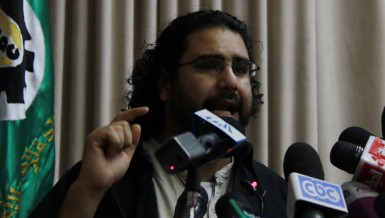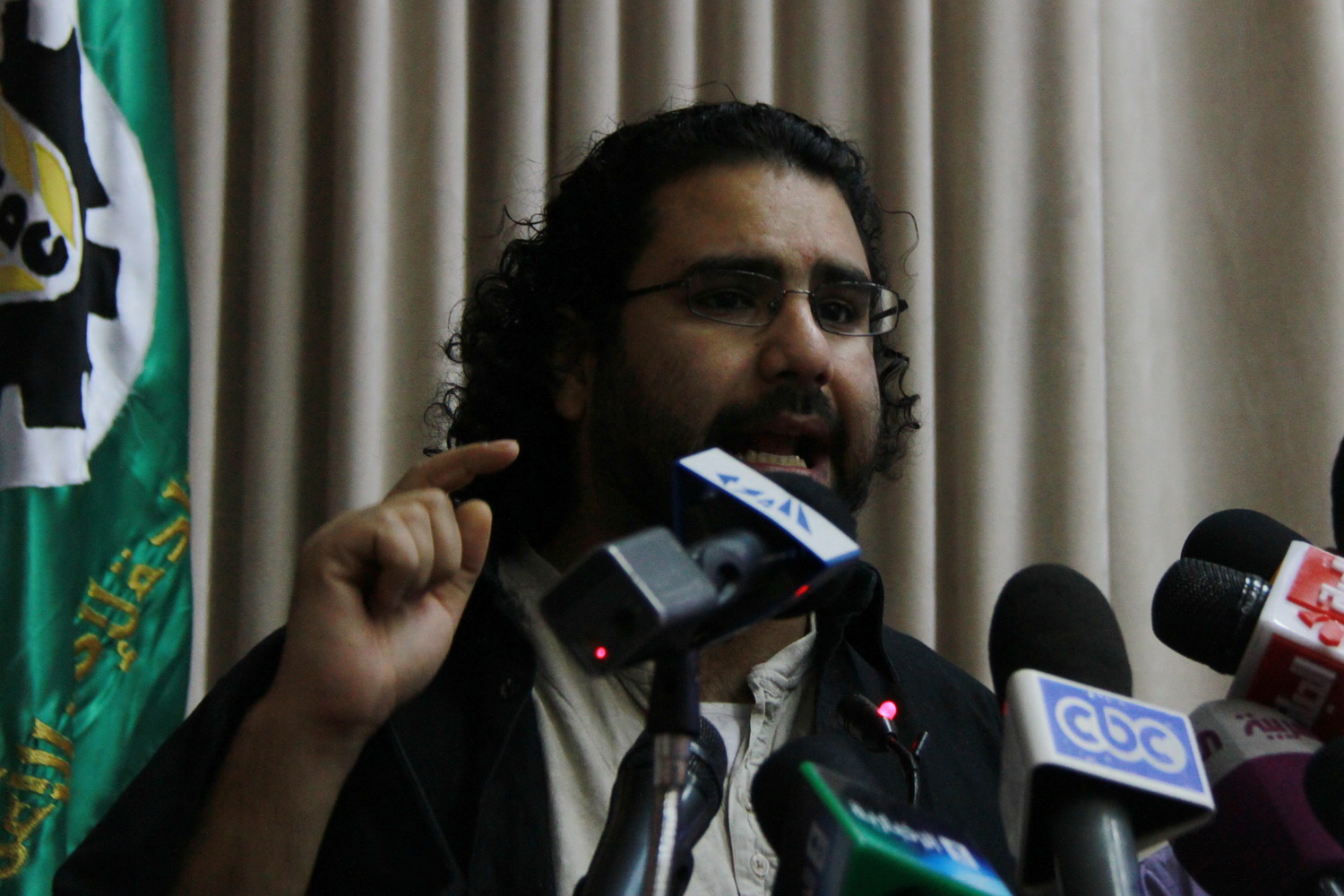
Update: Prosecution orders four days of detention pending investigation on charges of inciting violence and calling for a protest without Ministry of Interior’s authorisation.
Security forces raided on Thursday night the house of prominent political activist Alaa Abdel Fattah, taking him into custody.
An arrest warrant had been issued for Abdel Fattah for organising a protest outside the Shura Council on Tuesday to decry allowing military trials for civilians in the new constitution. The protest failed to comply with the newly-passed and highly controversial Protest Law; its organisers did not formally notify the authorities with the planned protest three working days in advance as the law stipulates.
Abdel Fattah reportedly faces charges of rallying, “thuggery”, inciting violence, resisting authorities and violating the Protest Law, according to state-run Al-Ahram. His sister, Mona Seif, reported Thursday night that Abdel Fattah was being held in a Central Security Forces barracks on the Cairo-Alexandria desert road.
Abdel Fattah appeared at the Cairo Security Directorate on Friday afternoon, where his investigation is expected to begin shortly, according to Seif.
The political activist was arrested from his home at around 10pm on Thursday. His wife reported through twitter that security forces broke into their house, beat her and her husband, arrested Abdel Fattah and confiscated both of their laptops and mobile phones. His sister, Mona Seif, tweeted that the police refused to provide a warrant from the prosecution for arresting Abdel Fattah from his home and confiscating his electronic devices. Seif’s twitter account was later hacked.
“If police [has] already beaten me in our house, what are they going to do to Alaa?” The wife tweeted. “I fear for his safety.”
Abdel Fattah had already expressed his intention to hand himself in to the authorities on Saturday. He also officially informed the Prosecutor’s Office by telegram and by letter, as well as the Attorney General for Central Cairo, of his intention to hand himself in on Saturday mid-day to the Prosecution at the prosecution’s Qasr Al-Nil office.
He released a statement on Wednesday in response to the arrest warrant issued against him. Abdel Fattah expressed his wonder that Egyptian authorities publicised the arrest warrant via the media instead of formally notifying him through sending the warrant to his home.
In the statement, Abdel Fattah stressed that he doesn’t recongise the Protest Law. He also challenged the legitimacy of the ruling regime, holding them responsible for the killing of citizens in clashes which started in July, including the Republican Guards clashes which left over 50 killed and the forcible dispersal of the pro-Mohamed Morsi Rabaa Al-Adaweya and Al-Nahda sit-ins which left at least 650 protesters killed.
“Despite all this, I have decided to do what I’ve always done and hand myself in to the Prosecutor General,” Abdel Fattah said in his statement. “I do not deny the charge, even though I cannot claim the honour of bringing the people into the street to challenge the attempts to legitimise the return of the [Former President Hosni] Mubarak state.”
The arrest warrant was issued against Abdel Fattah alongside Ahmed Maher, 6 April Youth Movement’s founder and former coordinator. Both were held responsible for the Tuesday protest outside the Shura Council building.
The protest was dispersed within minutes, using water cannons and teargas. Over 51 were arrested during the protest’s dispersal, including a group of female activists who were later released on the same day. They claim to have been dropped off in the desert by security forces, amid the Ministry of Interior’s denial. Twenty-four men remain in detention since the protest’s dispersal. Their detention was renewed for further 15 days on Thursday; they meanwhile announced going on a hunger strike, claiming to have been beaten during their arrest and detention.
Abdel Fattah had been legally persecuted during the former regimes of Morsi, for allegedly inciting violence against Muslim Brotherhood members, and Mubarak. He was also detained for two months in 2011 under the rule of the Supreme Council of the Armed Forces (SCAF) for allegedly assaulting soldiers during the attacks carried out by army forces against a predominantly Coptic protest outside the Maspero building in October 2011.



